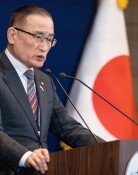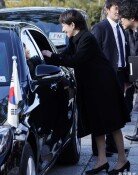More Koreans Join US Military to Get American Citizenship
More Koreans Join US Military to Get American Citizenship
Posted June. 17, 2009 05:56,
More Korean students in the United States and Korean Americans are enlisting in the U.S. Armed Forces via the Military Accessions Vital to National Interest recruitment program.
Questions are pouring onto the billboards of Korean community Web sites in the U.S., with some devoted exclusively to the recruitment program.
The Wall Street Journal said May 29 that up to 8,000 Koreans applied for the recruiting program that will select 890 applicants from Feb. 23 next year.
Sgt. 1st Class Jeong Dong-gu of the recruiting center in Los Angeles, however, said, The real number of applicants will be much more than this.
The temporary recruitment program seeks to encourage immigrants fluent in the strategically important languages of Arabic, Farsi (Iran) and Korean to join the U.S. forces. U.S. Defense Secretary Robert Gates proposed the program at the end of last year.
The 890 successful applicants will comprise 557 specialists in 35 languages and 333 medical staff. Army interpreters must serve four years and military doctors and nurses three years for an annual salary of 20,000 U.S. dollars.
Following recruitment in New York at the end of February, recruitment in Los Angeles began last month. Since many Koreans applied to the program, the recruitment for Korean-language specialists is now complete.
The Los Angeles recruitment center said, We were puzzled over the large number of Koreans who applied. The original qualification was a high school diploma or higher, but now we accept graduates with a bachelor`s or higher degree.
Koreans are applying to the program because they can get U.S. citizenship in less than six months after enlisting.
Getting a U.S. passport for a Korean can be difficult. Lawyer Lee Cheol-woo of the law firm Hanul said, Green cards are issued only to those who are professionals or investment immigrants after undergoing strict screening tests. You also have to wait three to five years even after getting a green card, but if you serve in the military, you can get one. This is why its popular.
A 24-year-old male Korean student at UCLA who is considering applying to the recruitment program said, When you become a U.S. citizen, you pay less tuition and can get a job more easily. If you have to serve in the military, many believe serving in the U.S. Army is better.
Bad employment prospects in both Korea and the U.S. have also prompted young ethnic Koreans to enlist in the U.S. Army.
One 30-something Web user who had completed his Korean military duty posted this message on a Korean community Web site: I studied hard and finished my degree, but there arent many things to do here and I cannot go back to Korea. Ive decided to join the military again for my family.
yunjung@donga.com







